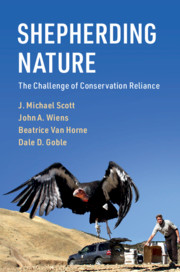Book contents
- Shepherding Nature
- Shepherding Nature
- Copyright page
- Contents
- Preface
- Acknowledgments
- 1 Extinction and the Challenge of Conservation Reliance
- 2 The Conservation Spectrum
- 3 The Genesis of Conservation Reliance and the Language of Conservation
- 4 What Are the Threats?
- 5 Emerging Threats in a Rapidly Changing World
- 6 The Role of Policy and Law
- 7 What’s in the Conservationist’s Toolbox: Species-Centered Approaches
- 8 Expanding the Conservationist’s Toolbox: Going Beyond Species
- 9 Conservation Reliance Is a Human Issue
- 10 Making Tough Decisions: Prioritizing Species for Conservation
- 11 Being a Good Shepherd
- Book part
- Essay Contributors
- References
- Index
6 - The Role of Policy and Law
Published online by Cambridge University Press: 28 February 2020
- Shepherding Nature
- Shepherding Nature
- Copyright page
- Contents
- Preface
- Acknowledgments
- 1 Extinction and the Challenge of Conservation Reliance
- 2 The Conservation Spectrum
- 3 The Genesis of Conservation Reliance and the Language of Conservation
- 4 What Are the Threats?
- 5 Emerging Threats in a Rapidly Changing World
- 6 The Role of Policy and Law
- 7 What’s in the Conservationist’s Toolbox: Species-Centered Approaches
- 8 Expanding the Conservationist’s Toolbox: Going Beyond Species
- 9 Conservation Reliance Is a Human Issue
- 10 Making Tough Decisions: Prioritizing Species for Conservation
- 11 Being a Good Shepherd
- Book part
- Essay Contributors
- References
- Index
Summary
Many nations have developed policies and enforced legal approaches for addressing the needs of species at risk of extinction. Generally, however, conservation reliance is not acknowledged legally and is therefore ignored. Increasingly, legal approaches reflect the importance of (1) values in addition to hunting and fishing, (2) wildlife as a shared resource, (3) intrinsic rather than instrumental value, (4) helping species to become self-sustaining, and (5) long-term support for imperiled species. The International Union for the Conservation of Naturehas provided an international standard for recognizing species status. In the United States, the Endangered Species Act and National Environmental Policy Act provide a legal framework for species conservation that has been effective (although these acts have also spawned many legal challenges that have consumed the time and resources of stakeholders). The effectiveness of imperiled species laws depends on funding that can vary, leading to varying implementation and enforcement. Conservation reliance is seldom addressed explicitly. Responsibility for implementation may be spread across national, state or province, and more local entities.
Keywords
- Type
- Chapter
- Information
- Shepherding NatureThe Challenge of Conservation Reliance, pp. 158 - 195Publisher: Cambridge University PressPrint publication year: 2020



